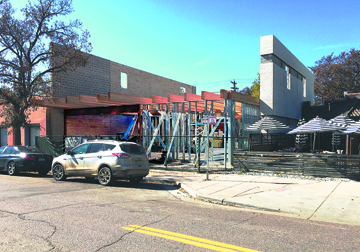Coworking Expands, Corporate HQs Replacing District Shops, Claim It’s Now Second Oldest Commercial Block
by Glen Richardson
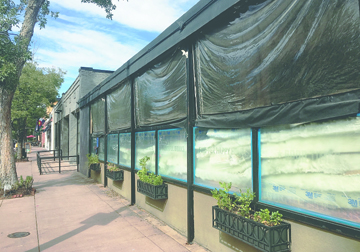
This holiday season will be the last for one of Denver’s oldest gift shops as the 45-year old Tender Thicket along Old South Gaylord has lost its lease to a developer. It’s the conclusive indicator that this is the end of an era for Denver’s second oldest historic district. The Thicket’s home on Gaylord St. is close to 100 years old. — it’s historic — but the neighborhood decided not to designate it that way and that applies to all the stores along Gaylord.
Larimer Square is Denver’s only locally protected historic district, designated in 1971 after a determined Dana Crawford saved the block. Its historic designation was the first in Denver that recognized not only individual historic buildings but a collection of buildings and their setting.
The quaint Gaylord block in the heart of Wash Park — between Mississippi and Tennessee Ave. — was, until the last couple of years, home to unique shops but is shifting into a commercial block similar to how Cherry Creek North is changing. Until recently area realtors could claim Old South Gaylord was the embodiment of what a neighborhood should look like, a historic district of inviting boutiques, art galleries and great restaurants.
Distressing Demolition
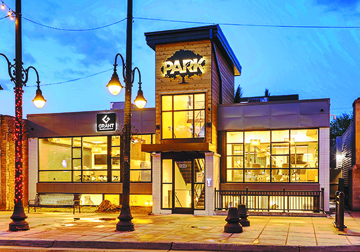
The Tender Thicket survived three moves, four owners, a flood, economic ups and downs, but redevelopment will be its final move. Grant Real Estate Co. owner Aaron Grant purchased the 5,500-sq.-ft. building that houses the Thicket and adjacent Edward Jones building (now vacant) for $2 million. At the same time in 2017 Grant purchased the building at 1040 S. Gaylord for $2.9 million and converted it into Park Coworking that is now open with 24 stations and 16 dedicated desks. He now plans to bulldoze the other two buildings and add a second coworking space. “It hurts my heart that this cute neighborhood will no longer be part of the Old South Gaylord community,” Tender Thicket owner Maury Ankrum tells the Chronicle.
The Thicket building was once a pharmacy and, in fact, they resurrected the pharmacy counter as their checkout counter and still have the first medicine cabinet in the back. “It was important to me to keep a bit of its history intact,” she says.
Ankeum is now looking for a new location, but hasn’t yet found the perfect fit. I am profoundly grateful and humbled for the years of love and support this neighborhood has given us,” she adds. “We will miss it dearly. I hope my customers will stop by to say goodbye and snag some fantastic deals as they check off their holiday list.”
History Lost

While the Tender Thicket building is believed to be Gaylord’s oldest, the block is dramatically changing as several developers are buying up the land to add office space in lieu of retail and restaurants. The Thicket is just one of many stores that have left or are leaving.
On the west side of the street, Gaylord has lost Denver’s No. 2 ranked art gallery Arts at Denver, a tailor, two hair salons and a bike shop. In addition to the Thicket, the east side of the street has lost or is losing The Tavern, Washington Bark, Sole Sisters (a shoe store), Little Angels (a pet boutique) and Edward Jones.
The prime corporate takeover of historic assets taking place on the west side of Gaylord is the corporate purchase of the former bike shop (Singletrack Factory) near the corner of Gaylord and Tennessee by LotusGroup Advisors.
Corporate Takeover
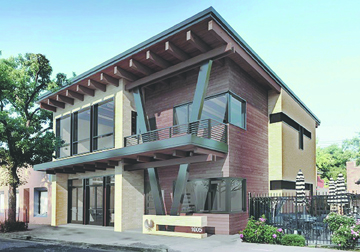
The Cherry Creek-based financial firm’s Managing Partner Raphael Martorello paid $1.4 million for the property, has bulldozed the building and is spending at least another $1.8 million to build out a 7,200-sq.-ft. two-story corporate office in the heart of the historic Wash Park neighborhood.
Designed by Neo Era Architecture and being built by 303 Construction, the firm had projected completion in the second quarter of this year. In mid-Oct. as this article was written only two of the four walls of the corporate space are up.
When announcing the project along what he called a quaint and nice street, Martorello said he chose the site because we wanted to achieve a “commercial building that feels like a home.” At the time he declared the new corporate HQ would have “an open floor plan, energy efficient construction, many spaces for collaboration, and improved parking over Cherry Creek.”
Gaylord’s History
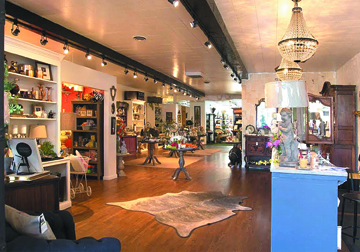
The 1920s were the golden age of movie theaters, and, in 1925 Gaylord opened its own motion picture palace. The Washington Park D & R Theater (now home to Charcoal Bistro) at 1028 South Gaylord St. was built by Carl Adler, who also operated the South Gaylord Home Bakery. On opening night of the theater in August 1925, two Shetland ponies were given away as a promotional event. The Washington Park R & D viewed itself as symbolizing “a new ideal in entertainment,” a community theater which was up-to-date in every detail.
A business district was flourishing along South Gaylord by the early 1920s. Chrysler & Son was the first to establish a business in the area, erecting a brick store at 1075-1083 South Gaylord St., in 1915. Historians say that the shopping area “was mostly a product of the 1920s when streetcar #5 terminated there and attracted shoppers on their way to and from work.” The 1000 block of South Gaylord was zoned Business-Retail when the city was first zoned in 1925. By 1930 the block featured three clothes cleaners, two beauty parlors, two barbers, two plumbers, a sheet metal worker and a shoe repair shop.
As Denver basks in a period of massive growth combined with the commercial potential of historic districts, the historic designation of buildings and homes is likely to have little impact on the ground. Developers from Denver and elsewhere will continue to receive over-the-counter demolition permits and raze buildings and homes to destroy history for profit.

